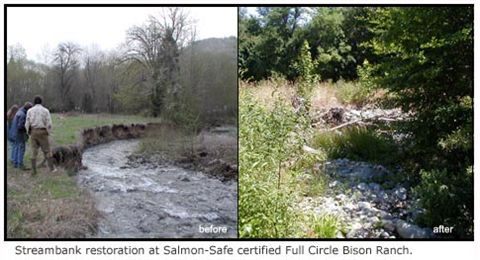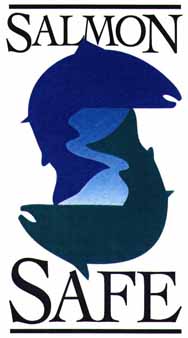Purpose
- Explores and develops market-based solutions.
Summary
Salmon-Safe Applegate is an innovative free market conservation initiative engaging southern Oregon’s agricultural sector in environmental sustainability while building high value local markets for the region’s agricultural products. The project is a collaborative effort with farmers, a watershed council, and other local stakeholders to protect water quality, wildlife, and riparian habitat in an ecologically important tributary to the Rogue River.

Description


Farmers in southwestern Oregon face intensifying regulatory scrutiny with the collapse of native salmon populations and long-term water shortages in the region. Chinook and coho salmon and steelhead trout populations are at historic lows in the Rogue Basin, which is one of the most biologically diverse areas of the country. Salmon-Safe Applegate has effectively worked with more than 30 landowners to transform farming practices in this ecologically important watershed while building a regional market for environmentally sound agricultural products in southern Oregon.
Key Accomplishments to Date
- Provided technical assistance to assist approximately 30 family scale farmers transition to fish friendly agriculture practices that include greater habitat protection for salmon. Twenty six of the operations have received formal Salmon-Safe certification offering products ranging from beef and bison to wine and goat cheese to organic cut flowers.
- Developed a “Salmon-Safe Applegate” regional marketing identity for both organic and conventional farm products from the basin and assisted in the development of new retail, wholesale, and direct marketing opportunities for 15 growers.
- Established operating partnership between Oregon Water Trust and Salmon-Safe that includes sharing landowner referrals in the Rogue Basin and a new "fast track" Salmon-Safe certification for Oregon Water Trust growers interested in market recognition for innovative water management or irrigation efficiency activities.
- Continued monitoring program at 5 on-farm sites to quantify the ecological benefits of adopting fish-friendly farm production systems.
- Offered two high profile public events, including a second annual Salmon-Safe Applegate Grower Field Day and a "Buy that Fish a Drink and Protect Your Water Rights" seminar & field tour with Oregon Water Trust.
- Demonstrated leadership throughout the region in voluntary restoration efforts to recover native fish, including hosting regional media.
As we complete our Walker Foundation-funded project work, Salmon-Safe is focusing on landowner retention, habitat restoration, and further building local and regional markets for certified agricultural products. We’re having early success in developing a regional identity for farmers in the basin and we’ve begun quantifying the ecological benefits of Salmon-Safe farming practices. The project is serving as a model for new Salmon-Safe initiatives that are expanding in several key Puget Sound watersheds, as well as informing our plans for introducing Salmon-Safe further afield on the Pacific Coast.

Purpose
As a free-market conservation initiative with national applicability, Safe Applegate specifically addresses the key market-based purpose of the Alex Walker Foundation. The project is a collaborative effort with Applegate River Watershed Council, rural landowners, and other local stakeholders to create market incentives for habitat conservation while delivering economic benefits back to landowners. Regulatory agencies and farmers have long faced the challenge of implementing water quality management plans and watershed restoration plans in the context of historically low fish populations and drought conditions. With more than 30 farms transitioning to Salmon-Safe practices, the project has provided a tangible example of the power of market-based conservation to encourage stewardship on private lands. The project also has investigated both the economic and ecological impacts of market-based conservation.
Scope
While Salmon-Safe Applegate focuses on this key tributary to the Rogue River, the locally-managed template that we’ve developed in the Applegate is being transported to other Pacific coast watersheds where landowners are seeking non-regulatory solutions to water quality and endangered species issues. The project is now being replicated in the Snoqualmie and several other key Puget Sound watersheds near Seattle, as well as on Tomales Bay, near San Francisco. Salmon-Safe also was approached in September, 2006, by a Vancouver, B.C., based foundation regarding application of the Applegate model on the Fraser River.
Information Dissemination
As the template for our watershed-based and locally managed approach for expansion across the West Coast, Salmon-Safe Applegate has been our organization’s highest profile initiative. Project results have been disseminated at more than five regional conferences, through the www.salmonsafe.org web site, and through many media articles. Additionally, the project will be included in the book "Farming and the Fate of Wild Nature," to be published by University of California Press in November 2006. Salmon-Safe and Applegate River Watershed Council also worked to engage the local Applegate community in the project’s success by placing multiple articles and project updates in The Applegater, the local newspaper, as well as offering field tours and other public events.
Project Link http://www.salmonsafe.org/farms/applegate.cfm
Amount Approved$20,000.00
on 11/30/2005
(Check sent: 12/12/2005)